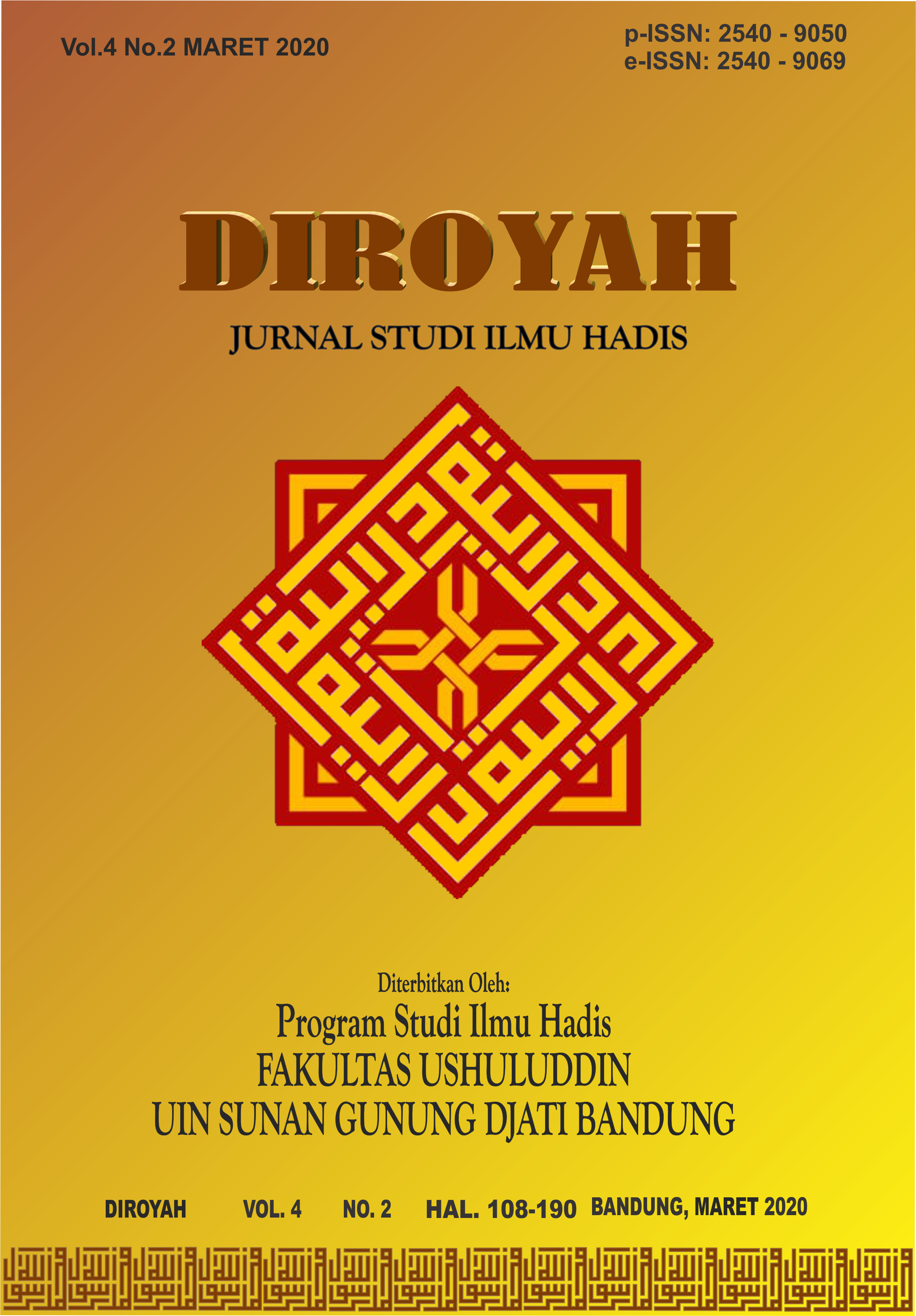Redefining Hadith by The Zahirism of Ibn Hazm
Main Article Content
Abstract
The perception of Ibn Hazm's thought on hadith as a Muslim intellectual who always puts forward the principles of textual Zahirism (dhÄhiriyyat al-nash) in establishing a legal conclusion (istidlÄl al-hukm) has implications for the general principles of understanding and position of hadith or al-sunnah. These implications will generally lead to the strengthening of the dhÄhiriyyat al-nash paradigm or vice versa. This study employs a qualitative method with historical analysis and literature study along with relevant information of the study.This study explores Ihn Hazm's ideas about hadith, written in several of his works. Thus, it can be concluded that Ibn Hazm did not just use hadith for the sake of his madhab; he was also suspected of redefining or reconceptualizing various understandings of hadith. Finally, Ibn Hazm has rationalized the hadith according to the context and paradigm he is carrying. Hadith terminology cannot separate from the influence of discourse outside of hadith, such as knowledge, law, politics, and social religion.
Article Details
Authors who publish with this journal agree to the following terms:
- Authors retain copyright and grant the journal right of first publication with the work simultaneously licensed under a Creative Commons Attribution-NonCommercial-ShareAlike 4.0 International License that allows others to share the work with an acknowledgment of the work's authorship and initial publication in this journal.
- Authors are able to enter into separate, additional contractual arrangements for the non-exclusive distribution of the journal's published version of the work (e.g., post it to an institutional repository or publish it in a book), with an acknowledgment of its initial publication in this journal.
- Authors are permitted and encouraged to post their work online (e.g., in institutional repositories or on their website) prior to and during the submission process, as it can lead to productive exchanges, as well as earlier and greater citation of published work (See The Effect of Open Access).
References
Andalusi, Ibnu Hazm al-. al-Ihkam fi Ushul al-Ahkam, jilid I, Bairut: Dar al-Afaq al-Jadidah, t. th.
-------------, “al-TaqrÄ«b li Hadh al-MantÄ«q†dalam IkhsÄn AbbÄs (ed), RasÄil Ibnu Hazm al-AndalusÄ«, Jilid. II, Bairut: Dar al-Faris, 2007.
Arnaldez, Roger. “La place du Coran dans les "Uṣūl Al-Fiqh" d'après le "MuḥallÄ" d'Ibn Ḥazm, Studia Islamica, No. 32, (1970).
Bedir, Murteza. ‘An Early Response to ShÄfiÊ¿Ä«: ʿĪsÄ b. AbÄn on the Prophetic Report (Khabar)’, Islamic Law and Society, Vol. 9, No. 3, (2002).
Busrikh, Taha. al-Manhaj al-Hadītsī li Ibnu Hazm al-Andalūsī, Bairut: Dar Ibnu Hazm, 2001.
Calder, Norman. Studies in Early Muslim Jurisprudence, Oxford: Clarendon Press, 1993.
Fierro, Isabel. “The Introduction of Hadits in al-Andalusâ€, Der Islam, LXVI, (1989).
Goldziher, Ignaz. The Zahiris: Their Doctrine and Their Histtory, Leiden: E.J. Brill, 1971
Hallaq, Wael B. “Was the Gate of Ijtihad Clossed?â€, International Journal of Middle East Studies, vol. 16, No. 1, (1984).
al-Khasyani, Ibn al-Faris. Qudhatu Qurtuba, Cairo: Dar al-Kitab al-Misri, 1989
------------------, "Was Shafi'i Master Architect of Islamic Law?", International Journal of Middle Eastern Studies , vol. 25 (1993).
---------------, History of Islamic Legal Theories, Cambridge: Cambridge University Press, 1998.
Lucas, Scot C. “ Where Are the Legal Hadits? A Study of the Musannaf of Ibn Abi Syaibahâ€, Islamic Law and Society, vol, 15 (2008).
Lohlker, Rá½”diger. “Hadits and Islamic Lawâ€, Oriente Moderno, Anno 21, (82), (2002).
Makki, Mahmoud. “The Political History of al-Andalus 92/711 – 897/1492 “ dalam Salma Khadra Jayyusi (ed.), The Legacy of Muslim Spain, vol. I, Leiden: E.J. Brill, 1994.
Melchert, Christopher. The Formation of the Sunni Schools of Law, 9th-10th centuries CE, Studies in Islamic Law and Society (Leiden: E. J. Brill, 1997).
--------------. “The Piety of Hadits Folkâ€, International Journal of Middle East Studies, vol. 34, (2002).
Montada, Josep P. “Reason and Reasoning in Ibnu Hazm of Cordobaâ€, Studia Islamica, No. 92, (2001).
Raisuddin, A.N.M. “Baqi’ Ibn Makhlad al-Qurtubi (201-276./816-889) and His Contribution to Study of Hadits Litterature in Muslim Spainâ€, Islamic Studies, Vol. 30, No. 1 / 2 (1991).
Schacht, Joseph. The Origin of Muhammadan Jurisprudence, Oxford: Clarendon, 1950.
Tritton, A.S. “Ibn Hazm : The Man and The Thinkerâ€, Islamic Studies, vol. 3, No. 4 (1964).
Zuhri, H. Filsafat Ibnu Hazm, Yogyakarta: Suka Press, 2013.

